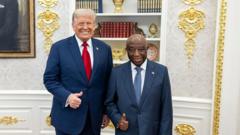Liberia, founded in 1822 by freed African-American slaves, boasts a significant historical link to the US. It declared its independence in 1847, drawing thousands of black Americans and freed enslaved individuals to its shores. This connection is reflected in various aspects of Liberian culture, language, and society, as well as in the country’s leadership. Notably, the capital, Monrovia, is named after US President James Monroe and features a flag nearly identical to that of the US, symbolizing its intertwined heritage. Liberia's prominent figures include Ellen Johnson Sirleaf, Africa's first elected female president and a Nobel Peace Prize laureate, plus notable athletes like Timothy Weah, the son of former president George Weah. Furthermore, the country is home to the world's largest rubber plantation operated by Firestone, highlighting both economic ties and serious labor issues.
Trump's Praise for Liberia: Six Essential Facts You Should Know

Trump's Praise for Liberia: Six Essential Facts You Should Know
US President Donald Trump's recent praise of Liberian President Joseph Boakai's "good English" has sparked interest in Liberia's rich history and connections with the United States. Here are six key points to understand about this West African nation.
In response to Trump's remarks, Liberia’s Foreign Minister emphasized the misunderstanding surrounding Africa’s multilingual capabilities, while reactions from Liberians varied — showcasing both pride in their linguistic heritage and critique regarding global perceptions of African nations.
Liberia's unique connection to the United States offers rich context for understanding its culture and leadership, countering stereotypes and promoting appreciation for its history.
Trump's recent praise for Liberia's president highlights the unique US-Liberia connection
US President Trump recently commended Liberian leader Joseph Boakai on his "good English," sparking a renewed interest in Liberia's historical ties to the US and the significance of its culture.
Understanding Liberia's past, including its founding by freed slaves, the naming of its capital after James Monroe, and its struggle for labor rights, is key to appreciating the depth of its relationship with the United States. The reaction to Trump's comments has revealed a mix of pride and critique among Liberians about how their country is viewed globally.
Liberia's unique connection to the United States offers rich context for understanding its culture and leadership, countering stereotypes and promoting appreciation for its history.
Trump's recent praise for Liberia's president highlights the unique US-Liberia connection
US President Trump recently commended Liberian leader Joseph Boakai on his "good English," sparking a renewed interest in Liberia's historical ties to the US and the significance of its culture.
Understanding Liberia's past, including its founding by freed slaves, the naming of its capital after James Monroe, and its struggle for labor rights, is key to appreciating the depth of its relationship with the United States. The reaction to Trump's comments has revealed a mix of pride and critique among Liberians about how their country is viewed globally.





















